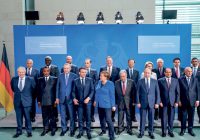US President Donald Trump’s idea of withdrawing a significant number of US troops from Germany is neither new nor a surprise. The White House issued the same threat once before, just ahead of the NATO summit in July 2018. At the time, the reasons given for the potential transfer of US forces were Germany’s inadequate contribution to NATO’s defense capability and its intention of acquiring more natural gas from Russia …







